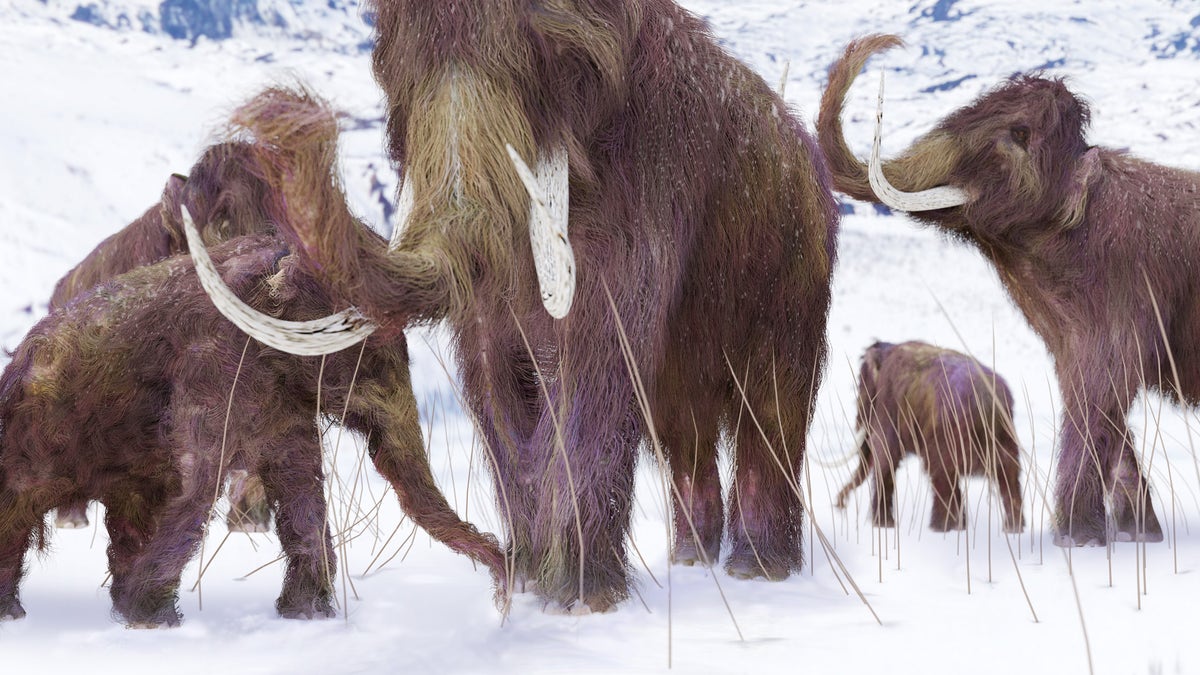
An illustration of a family of Woolly Mammoths grazing on what is left of the grasses as winter approaches in this ice age scene. (Credit: iStock)
The demand for ivory has sparked a “mammoth rush” in Siberia thanks to the discovery of preserved tusks and the increasing bans on international trade of elephant ivory.
Over the last few years, ivory dealers have been rushing to a remote Northern area of Siberia called Yakutia, which is five times larger than France, to bypass the ban on the sale of elephant ivory by selling the tusks of their extinct ancestors, the AFP reported.
CLICK HERE TO GET THE FOX NEWS APP
The discovery of mammoth tusks not only opened new business opportunities for the people in Siberia, but may also help to save the living elephants in Africa that often suffer at the hands of poachers seeking ivory.
“Our dead bones are saving living elephants,” local resident Prokopy Nogovitsyn told the news agency. “Being able to gather them is important both for us and for Africa.”
"Our dead bones are saving living elephants. Being able to gather them is important both for us and for Africa."
Yukutia is blessed by mammoth bones thanks to the area being covered by permafrost that effectively froze the remains of mammoths from tens of thousands of years ago. Authorities claim that 500,000 tonnes of mammoth tusks are buried in Yakutia, the AFP reported.
Many dealers are traveling to Siberia to obtain the ivory after China banned the imports and the sale of elephant ivory. According to trade statistics, Russia exported 72 tons, with 80 percent of it going to China.
The area was long-known to contain the mammoth tusks, with local residents picking up the bones along the river and sea coasts for decades now.
But the latest so-called “mammoth rush” has got to do with skyrocketing prices of ivory – making the expensive exploration in the Siberian wilderness profitable, with one kilogram of mammoth ivory being sold in China for $1,000, or $455 per pound, according to the AFP.
FROZEN WOOLLY MAMMOTH FOUND IN SIBERIA COULD BE NEW SPECIES, RESEARCHERS SAY
Despite the profits, the new industry is facing problems as the exploration is difficult due to the environment, where virtually no roads exist, and the lack of regulations.
“Ordinary people should know that they can pick something up off the ground, sell it, pay a tax, and live in peace,” one collector told the publication.
"Ordinary people should know that they can pick something up off the ground, sell it, pay a tax, and live in peace."
Last year, according to AFP, some collectors protested in the region amid accusations that the authorities confiscated their collected ivory even though they had a permit.
“Return tusks back to the people!” some signs at the protest reportedly read.
COULD REVIVING WOOLLY-MAMMOTH GENES FIGHT THE EFFECTS OF GLOBAL WARMING?
But the newly found source of ivory has also led to certain negative consequences, with some experts accusing of collectors of damaging sensitive areas and merely increasing the demand for ivory.
Yet Valery Plotnikov, a paleontologist at the Yakutia Academy of Sciences, dismissed such criticism, telling the outlet that the collectors actually help the scientific cause by providing specimens that the experts otherwise would have money to afford.
“We have a symbiosis with licensed collectors,” he said, pointing that collectors often give researchers items they found for free, though they would make a profit if the findings were to be exhibited.








































